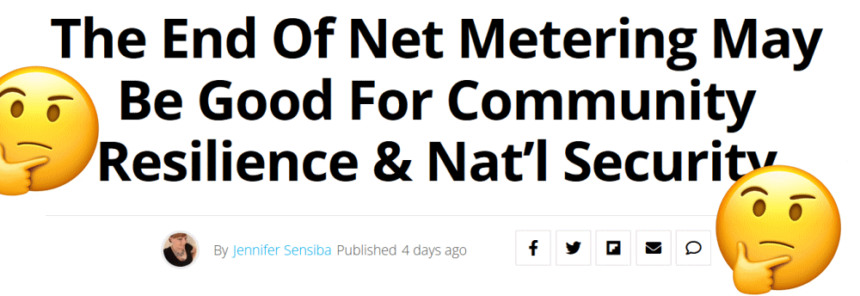Killing Net Metering Is Not a “Blessing in Disguise”

Gotta say, it was really weird to see something like this Op-ed on how attacks on net metering are a good thing on a site like CleanTechnica. But, you know, maybe there is something to it that I wasn’t aware of, so I approached it with an open mind. But unless I’m missing something, it seems to be promoting the idea that homeowners should buy local storage because that’s a “good thing” financially, and for the country because it’s better for the utilities?
Grids facing this problem obviously aren’t going to think it’s a great idea to pay people retail rates for their power. They’re having to not only sell power cheap or pay to give it away, but they’re also having to idle solar farms that have fixed costs regardless of whether they produce power that day.
Now, to be clear, I totally agree that there are valid reasons to add local energy storage; including resiliency from a poorly maintained grid, and as a defense measure against anti-solar adoption policies. But to actively promote that seems counter to the goal of increasing home solar uptake, and reducing deployment cost. More importantly, you don’t have to take my word for it. You can go read this Berkeley Lab study…
Compensation structures for residential solar are evolving toward a model that incentivizes using battery storage to maximize solar self-consumption. Using metered data from 1,800 residential customers across six U.S. utilities, we show that batteries operated solely in this manner provide customer bill savings up to $20–30 per kWh of storage capacity annually, but in some cases may provide virtually no grid value. The value gap relative to market-based dispatch is highly consistent across customers and will become more severe over time, insofar as increased renewable energy penetration leads to more volatile wholesale prices. This inefficiency stems from both a misalignment in the timing of battery dispatch relative to market value, and also because batteries used solely for solar self-consumption tend to stand idle on peak days. We show that incentivizing storage customers to respond to market prices, particularly on peak days, would enhance both private and public value. Unconstrained grid discharging increases exports to distribution networks, but 50–70% of the potential market value could be achieved without materially degrading solar self-consumption levels or increasing local grid stress.
Normally, I would just let it go as one of those “that’s crazy, but there are a lot of crazy media sources out there…” things. But up to this point I had a fairly positive outlook towards CleanTechnica content, so I looked into it a bit more, and it turns out the piece in question was written by an editor who also contributes to “The Truth About Guns”, a right-leaning media organization that our family-friendly DNS blocking service won’t let me access… Very interesting…
Obviously, there is a lot of room for nuance when it comes to the “right way” to do solar deployments. But, without hard data that we’re anywhere close to a tipping point where the author’s concerns around excess energy forcing solar plants offline, I really struggle to see any validity to the argument. Especially given the credibility of the authors in the study into this topic mentioned above.
Again, I am not arguing that local energy storage is a bad thing. The truth is much more nuanced than that. There are cases where it absolutely makes sense, and it would be stupid not to include it in the plan. My concern is that those cases are likely to be more an exception to the rule, than the rule. Advocating for policies that drive up the cost of PV is, in my opinion, backwards, short-sighted, and we should examine the motives of anyone who presents that as a good thing.
Am I missing something here?
